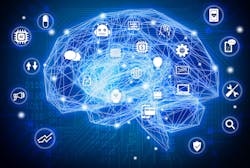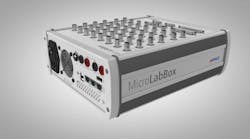ARLINGTON, Va. – U.S. military researchers are asking industry to develop computers able not only to analyze large amounts of data automatically, but also communicate and cooperate with humans to resolve ambiguities and improve performance over time.
Officials of the U.S. Defense Advanced Research Projects Agency (DARPA) in Arlington, Va., issued a broad agency announcement (HR001122S0052) on Thursday for the Environment-driven Conceptual Learning (ECOLE) project.
From industry, the DARPA ECOLE project seeks proposals in five areas: human language technology; computer vision; artificial intelligence (AI); reasoning; and human-computer interaction.
ECOLE will create AI agents able to learn from linguistic and visual input to enable humans and computers to work together to analyze image, video, and multimedia documents quickly in missions where reliability and robustness are essential.
ECOLE will develop algorithms that can identify, represent, and ground the attributes that form the symbolic and contextual model for a particular object or activity through interactive machine learning with a human analyst. Knowledge of attributes and affordances, learned dynamically from data encountered within an analytic workflow, will enable joint reasoning with a human partner.
This acquired knowledge also will enable the machine to recognize never-before-seen objects and activities without misclassifying them as a member of a previously learned class, detect changes in known objects, and report these changes when they are significant.
System interaction with human intelligence analysts is expected to be symbiotic, with the systems augmenting human cognitive capabilities while simultaneously seeking instruction and correction to achieve accuracy.
Industry proposals should specify how symbolic knowledge representations will be acquired from unlabeled data, including the specifics of the learning mechanism; how these representations will be associated and reasoned within a growing body of knowledge; how the representations will be applied to human-interpretable object and activity recognition; and how the framework will permit collaboration with several analysts to resolve ambiguity, extend the set of known representations, and provide greater recognitional accuracy and coverage.
The four-year ECOLE project with three phases; this solicitation concerns only the first and second phases. The first phase will create prototype agents that can pull relevant information out of unlabeled multimedia data, supplemented with human interaction.
These prototypes will demonstrate not only the ability to learn new concepts, but also to recombine previously learned attributes to recognize never-before-seen objects and activities. Systems also will be able to reason over similarities and differences in objects and activities.
The second phase of the ECOLE project will scale-up the framework to include several AI agents and human analysts to help deal with uncertain or contradictory information.
Computer interaction with human analysts will enable the system to learn to name and describe objects, actions, and properties to verify and augment their representations, and to acquire complex knowledge quickly and accurately from potentially sparse observations.
Humans and computers will work together primarily through the English language -- including words with several different meanings -- in a way that is readily understandable. The ECOLE project also will have two technical areas: distributed curriculum learning; and human-machine collaborative analysis.
Distributed curriculum learning involves multimedia data, and will use human partners provide feedback on the learning process. human-machine collaborative analysis will involve a human-machine interface (HMI) to improve ECOLE representations and analyze data such as multimedia and social media.
Companies interested should upload abstracts no later than 29 Sept. 2022, and full proposals by 14 Nov. 2022 to the DARPA BAA website at https://baa.darpa.mil.
Email questions or concerns to DARPA at [email protected]. More information is online at https://sam.gov/opp/fd50cb65daf5493d886fa1ddc2c0dd77/view.



